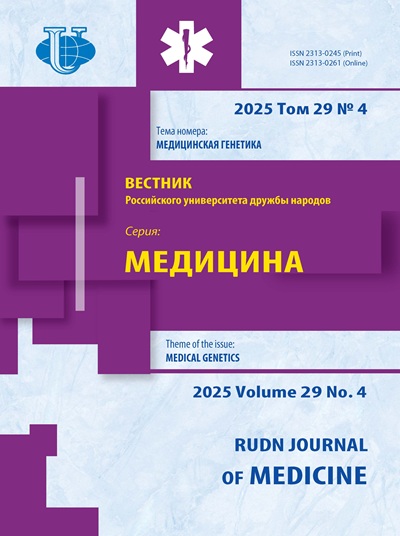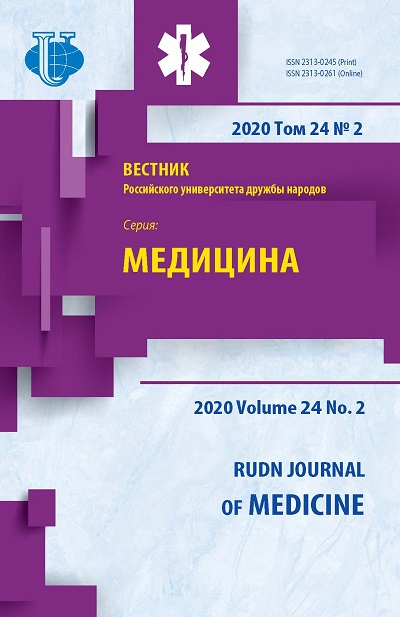Physiological substantiation for indicators application to evaluate the young students fitness health
- Authors: Mikhaylova S.V.1
-
Affiliations:
- Lobachevsky State University of Nizhni Novgorod
- Issue: Vol 24, No 2 (2020)
- Pages: 183-190
- Section: EXPERIMENTAL PHYSIOLOGY
- URL: https://journals.rudn.ru/medicine/article/view/23815
- DOI: https://doi.org/10.22363/2313-0245-2020-24-2-183-190
- ID: 23815
Cite item
Full Text
Abstract
To characterize fitness health, defined as the state of the physical well-being of the body, due to the functional state, physical qualities and component composition of the body, assessment methods are needed. The purpose of the study : physiological justification of the choice of indicators for assessing the fitness of students’ health. Methods: the study was conducted according to the results of preventive examinations of 303 students 18-24 years old at the Health Center, including: anthropometry, bio-impedance research and assessment of physical fitness. Results. To assess fitness health, we used an index of the component composition of the body, which characterizes the ratio of components (fat and active cell mass, water content and basic metabolism), which ensures the flow of metabolic processes, maintaining nutritional status, shaping the nature of working capacity and the adaptive potential of the body. The body composition index has the greatest correlation with the level of fitness health. Assessment of physical fitness, necessary when choosing an adequate regime of power and aerobic load, was carried out according to motor tests included in the RWD complex. Using the index method (power index, Skibinskaya index, endurance coefficient), the functional state of the basic life support systems of the body involved in the implementation of motor activity was characterized. Conclusions. The application of the studied indicators for assessing fitness health has a physiological justification and is confirmed by the correlation analysis.
About the authors
S. V. Mikhaylova
Lobachevsky State University of Nizhni Novgorod
Author for correspondence.
Email: fatinia_m@mail.ru
Arzamas, Russian Federation
References
- Sajkina, E.G. Fitnes v sisteme fizicheskoj kul’tury. Izvestiya Rossijskogo gosudarstvennogo pedagogicheskogo universiteta im. A.I. Gercena. 2008;68:182–190. (in Rus)
- Pate R.R. A new definition of youth fitness. Physician Sports Med. 1983.11: 77–83.
- Smirnova G.A. Vliyanie komponentnogo sostava tela na pokazateli fizicheskoj rabotosposobnosti. Izvestiya Rossijskoj Voenno-medicinskoj akademii. 2019; 3(S3):243–4.
- Sindeeva L.V., Zamkova E.V., Kazakova G.N. Harakteristika komponentnogo sostava tela studentov razlichnyh etnicheskih grupp v kontekste doktriny zdorov’ya. The Newman in Foreign Policy. 2019. № 48 (92). S.13–15. (in Rus)
- Nie F.F. Study on the incentive mechanism of college students’ physical health test. International symposium 2016. Common development of sports and modern society. 2016. P. 305–311.
- Bogomolova E.S., Kuzmichev Yu.G., Matveeva N.A. et al. Metody izucheniya i ocenki fizicheskogo razvitiya detej i podrostkov: uchebnoe posobie. N. Novgorod: Izdatel’stvo NGMA, 2015. 92 p. (in Rus)
- Mikhailova S.V., Kuzmichev Yu.G., Krasnikova L.I., Khrycheva T.V., Saburtsev S.A., Krylov V.N., Oshevensky L.V. Fiziologicheskie osobennosti adaptivnyh reakcij organizma. Zhurnal fundamental’noj mediciny i biologii. 2018;7(3):24–38. (in Rus)
- Dzhurinskij P.B., Mel’nikova A.A. Aerobnye uprazhneniya v sisteme ozdorovitel’nogo fizicheskogo vospitaniya studentov vysshih uchebnyh zavedenij. Odessa: YUGPU im. K.D. Ushinskogo, 2008. 91p. (in Rus)
- Pogodin V.V. Metodicheskie rekomendacii po podgotovke i sdache normativov komplek-sa GTO. Ul’yanovsk: UlGU, 2016. 224 p. (in Rus)
- Rudnev S.G., Soboleva N.P., Sterlikov S.A. i dr. Bioimpedansnoe issledovanie sostava tela naseleniya Rossii. M.: RIO CNIIOIZ, 2014. 493 p. (in Rus).
- Abramova T.F., Nikitina T.M., Kochetkova N.I. Labil’nye komponenty massy tela – kriterii obshchej fizicheskoj podgotovlennosti i kontrolya tekushchej i dolgovremennoj adaptacii k trenirovochnym nagruzkam. Metodicheskie rekomendacii. M.: OOO «Skaj-print», 2013. 132 p. (in Rus)
- Patent № 2313274 «Sposob ocenki effektivnosti ozdorovitel’no-trenirovochnoj programmy». Rudenko S.D. 2006. (in Rus).
- Price A.A., Whitt-Glover M.C., Kraus C.L., McKenzie M.J. Body Composition, Fitness Status, and Health Behaviors Upon Entering College: An Examination of Female College Students From Diverse Populations. CLINICAL MEDICINE Insights-womens health. 2016; 9(1):23–9. doi: 10.4137/CMWH.S34697
Supplementary files















